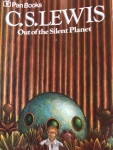Our Collective Identity

Mythology has come up a lot in the book I am reading while sitting where C. S. Lewis sat in the Common Room at The Kilns. The book is Out of the Silent Planet. I had not read Lewis’ acclaimed three volume Space Trilogy and was handed the books shortly after I arrived here for my Scholar in Residence Program. Wow, this is some incredibly thought provoking writing. One such quote from the book is, speaking of the character of Ransom, “It even occurred to him that the distinction between history and mythology might be itself meaningless outside the earth” (p. 169). The distinction between history and mythology lies in their nature and purpose. History is the study of past events based on evidence and facts, aiming to provide an accurate account of what happened. It often relies on primary sources such as eyewitness accounts, documents, and archaeological findings. The primary goal of history is to understand and interpret the past.

A place where the distinction of history and mythology gets blurred is the ideas of legends and heroes: American mythologies also include legends and heroes such as George Washington, Abraham Lincoln, and Martin Luther King Jr. These figures are celebrated for their contributions to American history and are often seen as symbols of national identity and values. I believe, however, these historical humans should be studied as human beings and not heroes or legendary myths.
On the other hand, mythology refers to a collection of stories, beliefs, and traditions that are often passed down orally or through written texts. Mythology may include elements of history but also incorporates supernatural, symbolic, and legendary elements. It serves various purposes such as explaining natural phenomena, teaching moral lessons, or outlining cultural values and beliefs.
The concept of the American Dream is a powerful myth in American culture. It represents the idea that individuals can achieve success, prosperity, and upward mobility through hard work, perseverance, and determination.
While history strives for accuracy and relies on verifiable evidence, mythology is more focused on conveying deeper truths and exploring the human experience through storytelling. Mythological narratives can be influenced by cultural, religious, and societal factors, making them subject to interpretation and evolution over time.
Mythologies and history are a part of all cultures around the world and play a significant role in shaping our values, rituals, and understanding of the world. They provide insights into a culture’s history, worldview, and collective identity.
leave a comment